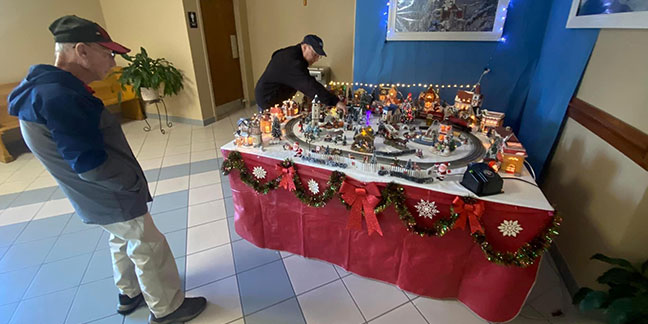A tradition for all ages
 Vic St. Pierre and Mike Ford, members of St. James the Greater Parish in Concord, set up a popular Christmas model train display – a tradition that was started by the late Father James Geiger when he was pastor. A model train, lighted buildings and figurines make up the display. CONCORD — A miniature Christmas tradition on wheels has been delighting people of all ages at St. James the Greater Parish in Concord for more than 15 years.
Vic St. Pierre and Mike Ford, members of St. James the Greater Parish in Concord, set up a popular Christmas model train display – a tradition that was started by the late Father James Geiger when he was pastor. A model train, lighted buildings and figurines make up the display. CONCORD — A miniature Christmas tradition on wheels has been delighting people of all ages at St. James the Greater Parish in Concord for more than 15 years.
Known as “The Christmas Train,” the model train set and Christmas village are set up in one corner of the parish’s office building, continuing a tradition started in 2008 by the late Father James Geiger when he was the pastor.
“Father Geiger was a train enthusiast, and he had quite a train collection himself,” said parishioner Vic St. Pierre, who took over setting up the train annually when Father Geiger retired. At age 98, St. Pierre still works on it annually, although he passed primary control on to fellow parishioner Mike Ford three years ago.
The original set featured only a small train, about six figurines and miniature houses, and fit on one table. Over the years, St. Pierre has added more houses and holiday figures, some part of his own Christmas village, and now the holiday display takes up two tables. The train runs on a circular track surrounded by lighted village buildings and dozens of miniature figures depicting wintertime scenes, including ice-skaters and a motorized figure of two boys having a snowball fight. The model also has Santa Claus, Christmas trees and a nativity scene, with artificial snow and Christmas lights adding the finishing touches.
“Children love it, and we also get a lot of comments from adults who come in to see it,” St. Pierre said. “It’s become very popular, and at my age it means a lot to be able to do this for the parish.”
The train set is especially popular with students at New Beginnings Preschool, which is run by the parish.
“Both the students and the staff get excited when they see Vic and Mike pull up on set-up day and start unloading their bins,” said Suzanne Carney, director of the preschool. “The children are absolutely mesmerized by the train set. Their faces light up when they see it, and they see details in it we as adults don’t see. When they stand around it, you can hear them talking, and their imaginations are running wild as they envision themselves in that little village.”
 It takes Ford and St. Pierre about three hours to assemble the train set. Both men love to see the joy the set brings to the preschool students, especially when they get to control the speed of the train.
It takes Ford and St. Pierre about three hours to assemble the train set. Both men love to see the joy the set brings to the preschool students, especially when they get to control the speed of the train.
“The looks on the kids’ faces is the best part of it,” Ford said. “You can tell it’s magical to them. Watching them absolutely brings out the kid in us.”
The entire train set is about seven feet long, and next year the men plan to widen it by about a foot to add more space for the displays.
“To me, tradition is the glue that holds us together, not just as a preschool family but as a church family, so it’s great to see Father Geiger’s legacy continue for the children,” Carney said. “He would be so proud to see how the village has grown and how his legacy is being honored.”
The Christmas train will be on display until after Epiphany.
— Christina Lee Knauss

